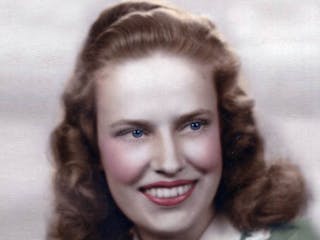Bethel Receives $3 Million Gift
News
January 20, 2015 | 8 a.m.
By Tricia Theurer, Communications Specialist

Eunice Singfeldt was a school teacher who was connected to Bethel through her Swedish Baptist roots.
Bethel University recently received its largest single estate gift, a $3 million gift from the estate of Eunice Singfeldt.
Singfeldt, who died last June at the age of 91, directed the majority of her gift to an endowed scholarship to benefit “worthy and needy students” in the College of Arts & Sciences (CAS). Dan Wiersum, associate vice president for planned giving, says, “This scholarship should generate about $100,000 in student aid the first year, and we hope it continues to grow.” The remainder of the funds will support building projects.
The only child of parents of Swedish ancestry, Singfeldt grew up in the Austin area of Chicago, Illinois. She and her mother and father attended Central Avenue Baptist Church, which has a strong connection to Bethel University. More recently, she worshipped at Calvary Memorial Church, where, she wrote, “I have found inspiration, fellowship, comfort, and encouragement.” It was also there that she met an attorney, whose daughter, Colleen (Hoy) Sahlas, also an attorney, is a 1993 Bethel graduate. All of these connections played a part in Singfeldt designating Bethel as a beneficiary in her will.
A graduate of Wheaton College, Wheaton, Illinois, Singfeldt held various secretarial positions before starting a teaching career in Chicago public elementary schools in 1950, where she served for 43 years before retiring in 1993. She served as a classroom teacher, librarian, counselor, and girls’ choir director. During this time, she earned a master’s degree from Northwestern University, Evanston, Illinois.
Singfeldt’s neighbor and close friend Lynda Ficca calls her “a good example of someone who saved and wanted her gifts to help others when she had passed.” Wiersum describes the former teacher’s gift as “the kind of gift that anyone could give through their will, because it doesn’t cost anything during their lifetime.”
Traveling was a pleasure and privilege for Singfeldt, who visited Europe, Alaska, Hawaii, and all but six of the lower 48 states. Ficca, who helped care for Singfeldt in her later years, says she also enjoyed maintaining connections with others through her prolific letter writing. “She was good about keeping up with social connections, and usually wrote to about 60-80 people per year,” Ficca says. “She kept connections going with people from church, old friends, and even former classmates and students.”
One special former student was Harry, with whom Singfeldt communicated until her death. Ficca recalls that Harry’s dad died when Harry was a young boy and as a result, his mother could no longer afford the boy’s piano lessons. So Singfeldt, who had a piano in her classroom, made a way for him to practice there. Her support extended to attending Harry’s piano recitals, encouraging his endeavors throughout his life, and socializing with Harry and his mother. “Harry never forgot about her kindness when he was a child. He always sent her cards and letters about his travels,” says Ficca. “To be connected to a student for almost 50 years. . . that’s something special.”
Besides traveling and staying connected with family and friends, Singfeldt maintained a strong faith in God. “Faith was very important to her,” Ficca recalls, “especially in those last few years, when she wasn’t as mobile.” Singfeldt was also a voracious reader and collector. Among her collections are travel brochures and 90 slide carousels—each contacting 140 labeled photos of her travels—for a total of tens of thousands of mementos.
Ficca, an elementary teacher herself, says, “Knowing how important teaching and education was to Eunice, I think she would be thrilled that this gift to Bethel would come to fruition and that so many students would benefit from the scholarship.” She adds: “A bit of Eunice will live on through these students.”